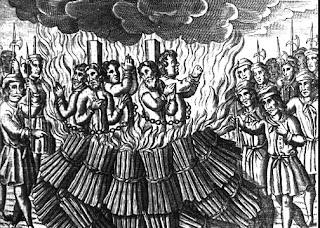When Gerard Segarelli was rejected by the Franciscans, he took matters into his own hands and formed the Apostolic Brethren in 1260. The Brethren, active in northern Italy, gained many followers with their life of extreme poverty and their message of repentance.
In 1274, at the Second Council of Lyon, Pope Honorius IV prohibited all mendicant orders if they were not sanctioned by the papacy. In 1280, the Bishop of Parma imprisoned Segarelli, and in 1286 banished him from the diocese.
The prohibition against unapproved mendicant orders was renewed in 1290 by Pope Nicholas IV, who also began going after those "orders"; the Brethren were a particular target.
In 1294, four members of the sect were burned at the stake. Segarelli himself was sentenced to life in prison, but on 18 July, 1300, he was burned at the stake in Parma after being made to confess that he had relapsed into heresy. The Apostolic Brethren gained a new leader in the charismatic Fra Dolcino, who is worth his own post someday.
The motto of the Brethren under Segarelli, and later under Fra Dolcino, was Poenitentiam agite [Latin: Make penitence]. This was abbreviated to Penitenziagite! and made known to millions of readers 680 years after Segarelli's execution in Umberto Eco's Name of the Rose.
 |
| [Source] |
The prohibition against unapproved mendicant orders was renewed in 1290 by Pope Nicholas IV, who also began going after those "orders"; the Brethren were a particular target.
In 1294, four members of the sect were burned at the stake. Segarelli himself was sentenced to life in prison, but on 18 July, 1300, he was burned at the stake in Parma after being made to confess that he had relapsed into heresy. The Apostolic Brethren gained a new leader in the charismatic Fra Dolcino, who is worth his own post someday.
The motto of the Brethren under Segarelli, and later under Fra Dolcino, was Poenitentiam agite [Latin: Make penitence]. This was abbreviated to Penitenziagite! and made known to millions of readers 680 years after Segarelli's execution in Umberto Eco's Name of the Rose.
